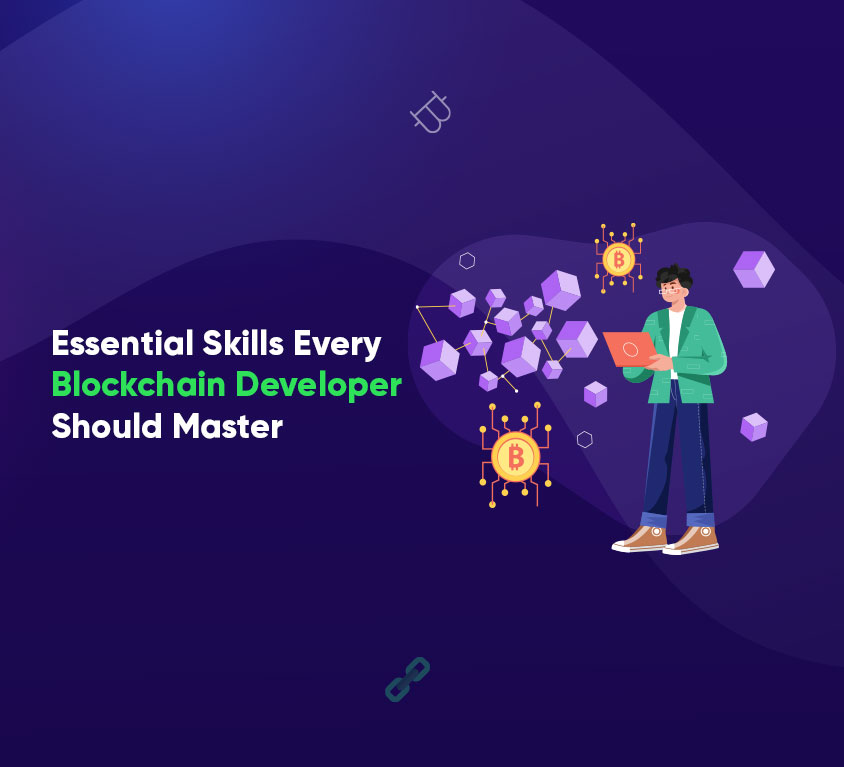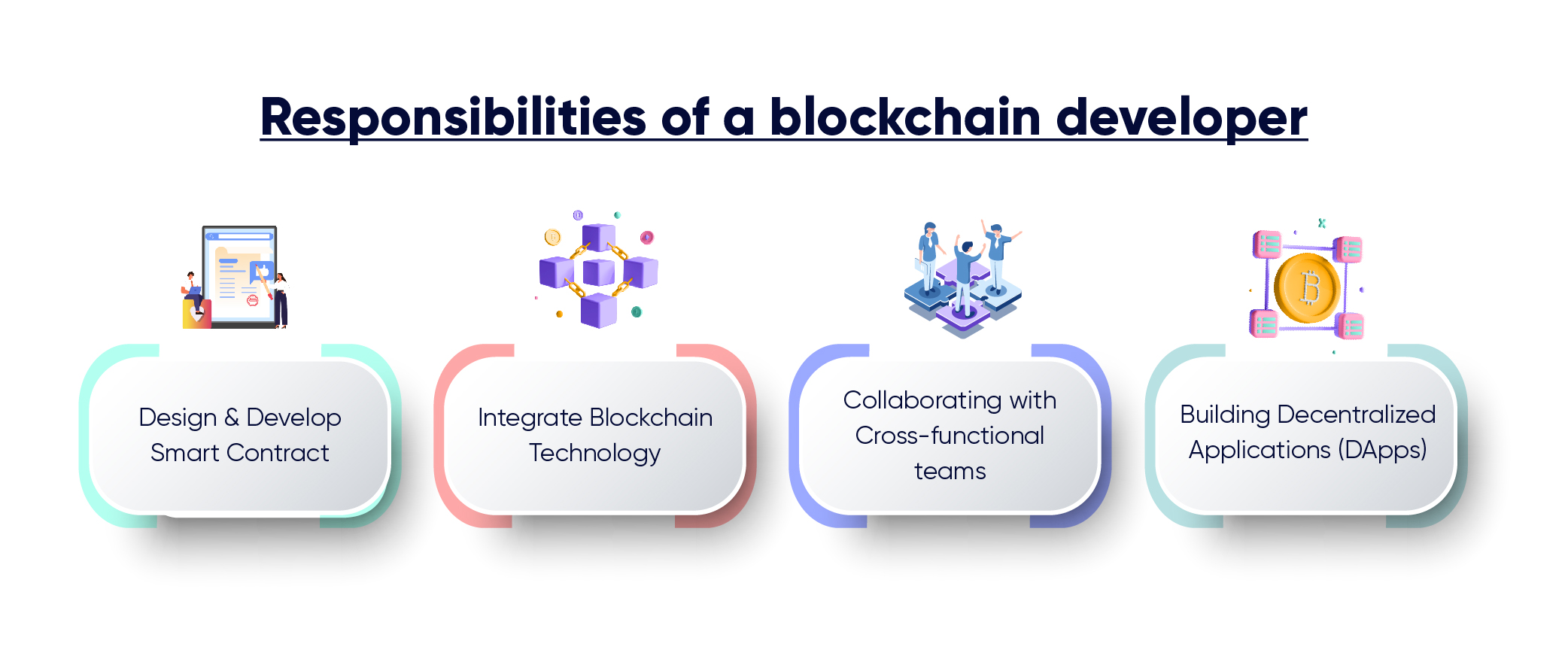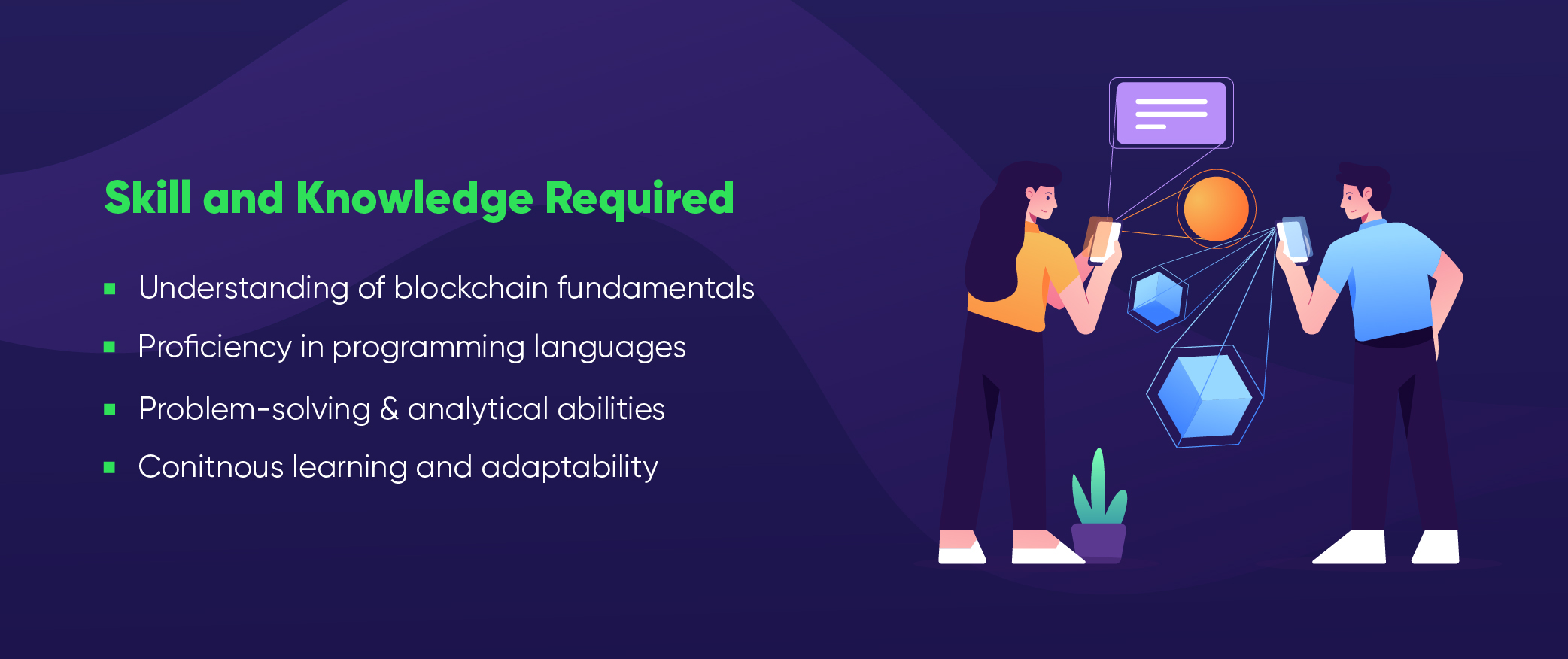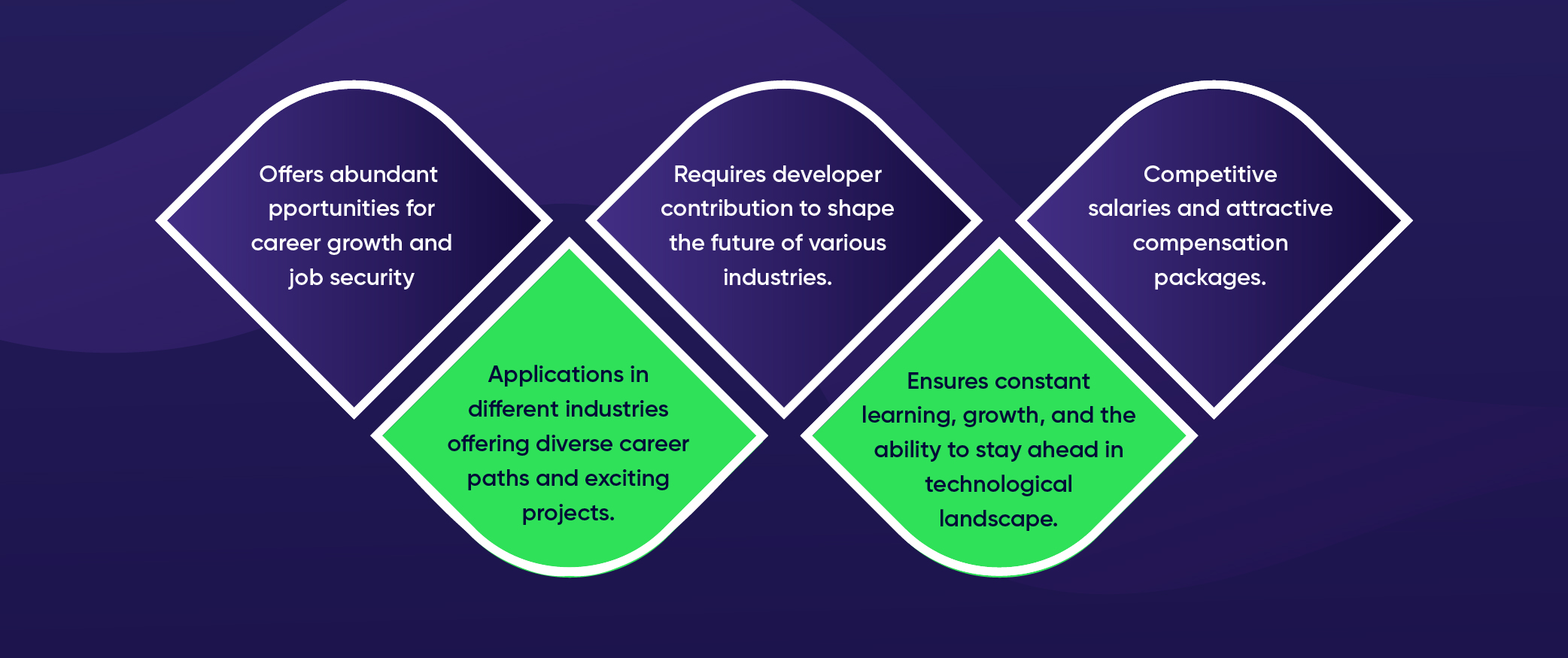
Introduction
Blockchain & Web3 Services Trusted By Leaders
- Develop innovative solutions using our state-of-the-art blockchain expertise.
- Achieve accelerated growth with robust & scalable Web3 consulting.
- Unlock 360-degree security with our top-rated blockchain development.
Essential Skills Every Blockchain Developer Should Master
Blockchain technology is reshaping industries and revolutionizing how data is secured and transactions are conducted. As the demand for Blockchain developers continues to grow, it becomes crucial to understand the essential skills needed to excel in this dynamic field. Moreover, one should know which is the right blockchain solution for your business. It does not matter if you are a beginner or an experienced developer looking to expand your expertise, this guide will enable you to know the critical skills every Blockchain developer should master. Let’s start exploring must-have blockchain developer skills you need to be well-equipped to navigate the complexities of Blockchain development and contribute to the advancement of this transformative technology.Who is a Blockchain Developer?

What does a Blockchain Developer do?
- Design & Develop Smart Contracts: Blockchain developers create self-executing contracts using programming languages like Solidity, C++, or Python, ensuring the accuracy and security of transactions.
- Building Decentralized Applications (DApps): They develop applications that run on blockchain networks, leveraging the decentralized nature of blockchain to enhance security, transparency, and efficiency.
- Integrating Blockchain Technology: Blockchain developers integrate blockchain solutions into existing systems, enabling seamless interoperability and leveraging the benefits of blockchain for data security and trust.
- Collaborating With Cross-functional Teams: They work closely with other professionals such as designers, project managers, and blockchain architects to ensure successful implementation and deployment of blockchain solutions.

Blockchain Developers’ Skills and Knowledge
Blockchain developers are at the forefront of driving innovation and shaping the future of technology. The knowledge and skills that a Blockchain developer should possess include in-depth knowledge of distributed ledger technology, consensus mechanisms, and cryptographic algorithms. Although they are skilled in languages such as Solidity, C++, or Python, enabling them to code smart contracts and develop blockchain applications, they should also have familiarity with blockchain platforms and frameworks like Ethereum, Hyperledger, or Corda, and utilize frameworks to build scalable and secure solutions. Moreso, they must have the capability to identify and address challenges related to blockchain implementation, ensuring optimal performance and efficiency. As we all know Blockchain technology is rapidly evolving so developers must stay updated with the latest advancements and industry trends.How to Become A Blockchain Developer?
To become a blockchain developer, it’s essential to develop a strong foundation in blockchain technology, master relevant programming languages, gain hands-on experience with blockchain platforms, and continuously expand your knowledge through learning and collaboration. By following these steps and demonstrating your skills, you can enter the exciting world of blockchain development and contribute to the advancement of this transformative technology;
1. Understand the Fundamentals
Start by gaining a solid understanding of blockchain technology and its underlying principles. Learn about decentralized systems, consensus algorithms, cryptographic techniques, and smart contracts. Familiarize yourself with popular blockchain platforms like Ethereum and Bitcoin.
2. Master Programming Languages
Blockchain development often involves programming smart contracts and decentralized applications (DApps). Depending on the blockchain platform, learn programming languages such as Solidity (for Ethereum), C++, or Python. Acquire proficiency in writing secure and efficient code.
3. Explore Blockchain Platforms and Tools
Get hands-on experience with blockchain platforms and tools. Set up a local development environment, experiment with blockchain frameworks, and explore testing frameworks like Truffle. Gain practical knowledge of interacting with blockchain networks, deploying smart contracts, and using developer tools.
4. Build Projects and Join Communities
To strengthen your skills, work on real-world blockchain projects. Start with small applications and gradually tackle more complex projects. Join blockchain developer communities, participate in hackathons, and collaborate with other developers to gain insights and stay updated with industry trends.
5. Learn About Security and Privacy
Blockchain security is crucial, and understanding the best practices for securing blockchain applications is essential. Explore concepts such as private and public key cryptography, secure coding practices, and vulnerability assessments to ensure robust and secure solutions.
6. Stay Updated and Continuously Learn
Blockchain technology is evolving rapidly, so staying updated with the latest advancements is vital. Follow industry news, join blockchain-related forums, read research papers, and take online courses to expand your knowledge and keep up with the latest trends.
7. Showcase Your Skills
Create a portfolio of your blockchain projects to showcase your skills and experience to potential employers or clients. Demonstrating your practical abilities and highlighting the value you can bring as a blockchain developer will set you apart from the competition.
8. Collaborate and Network
Engage with other professionals in the blockchain industry, attend conferences, and join blockchain-focused meetups. Networking can open doors to job opportunities, collaboration, and mentorship, allowing you to grow both personally and professionally.
Why Become a Blockchain Developer?
Blockchain technology has gained significant traction in recent years, offering immense potential for transforming industries across the globe. As a result, becoming a blockchain developer presents numerous advantages and opportunities. Here are some compelling reasons to consider a career as a blockchain developer:Market Scope for Blockchain Developers
The market scope for blockchain developers is expanding rapidly, with organizations across industries recognizing the potential of blockchain technology. Here are some key aspects that highlight the market scope for blockchain developers:1. Increasing Adoption
More businesses are embracing blockchain technology to enhance security, transparency, and efficiency in their operations. This increased adoption fuels the demand for blockchain developers who can design and deploy blockchain-based solutions.
2. Finance and Banking
The finance and banking sector has been at the forefront of blockchain adoption. Blockchain developers are in high demand to build secure and decentralized financial systems, streamline transactions, and develop smart contracts for financial applications.
3. Supply Chain Management
Blockchain offers transparent and traceable supply chain solutions, ensuring integrity and reducing fraud. As a result, there is a growing need for blockchain developers to create platforms that enhance supply chain efficiency, accountability, and trust.
4. Healthcare and Medical Records
The healthcare industry can benefit greatly from blockchain technology, ensuring secure and interoperable medical records, efficient healthcare data management, and reliable patient identification. Blockchain developers play a crucial role in building decentralized healthcare solutions.
5. Government and Public Services
Governments worldwide are exploring blockchain for applications like identity management, voting systems, and public service delivery. Blockchain developers contribute to the development of secure, transparent, and efficient government services.
6. Startups and Entrepreneurship
The blockchain space is a breeding ground for startups and entrepreneurship. As a blockchain developer, you can collaborate with startups, work on innovative projects, and even create your own blockchain-based ventures.
Market Competition and Essential Skills Every Blockchain Developer Should Master
As the adoption of blockchain technology continues to accelerate, the demand for skilled blockchain developers is on the rise. However, the market for blockchain developers is highly competitive, and it’s essential to understand the value and scope of blockchain developer roles to thrive in this dynamic field.
Experience Level |
Annual Salary (Approx.) |
|---|---|
Entry-Level |
$60k – $80k |
Mid-Level |
$80k – $120k |
Senior-Level |
$120k – $180k |
Market Competition
The market competition for blockchain developers is intense due to the scarcity of skilled professionals. Organizations across industries are actively seeking blockchain developers to build innovative solutions and drive their digital transformation initiatives. This competition is fueled by the rapid growth of the blockchain industry and the need for expertise in areas such as smart contract development, decentralized application (DApp) creation, and blockchain integration. To stand out in this competitive landscape, aspiring blockchain developers must continuously enhance their skills, stay updated with the latest industry trends, and demonstrate a deep understanding of blockchain technology and its applications.Essential Skills Every Blockchain Developer Should Master
Blockchain developers play a pivotal role in unlocking the full potential of blockchain technology. Their expertise enables businesses to leverage the benefits of decentralization, immutability, and transparency offered by blockchain. Here’s a glimpse of the essential skills every blockchain developer should master:1. Designing and Developing Blockchain Solutions
- Responsible for designing and developing blockchain-based applications, platforms, and protocols.
- Utilize their programming skills and knowledge of blockchain frameworks and languages to create secure, efficient, and scalable solutions tailored to specific business requirements.
2. Smart Contract Development
- Specialize in creating smart contracts using programming languages like Solidity (for Ethereum) or languages specific to other blockchain platforms.
- Ensure the integrity and functionality of smart contracts, enabling automated and trustless execution of transactions.
3. Decentralized Application (DApp) Development
- Utilize skills in front-end and back-end development to design user-friendly and robust DApps.
4. Blockchain Integration and Interoperability
- Ensure seamless integration of blockchain networks with legacy systems, enabling secure data sharing, interoperability, and streamlined processes across organizations.
5. Security and Auditing
- Perform audits and vulnerability assessments to identify and mitigate potential security risks.
- By addressing vulnerabilities and ensuring the integrity of blockchain networks, developers play a vital role in maintaining trust and confidence in blockchain technology.
6. Industry-specific Solutions
- Blockchain developers have the opportunity to work across diverse industries, including finance, supply chain, healthcare, real estate, and more.
- Develop industry-specific solutions that address unique challenges and leverage blockchain’s potential to enhance transparency, efficiency, and trust within specific sectors.
Conclusion
In the end, we can say that as organizations recognize the transformative potential of blockchain, they seek to hire blockchain developers who possess the necessary skills and knowledge. These professionals are essential for building blockchain-based applications, smart contracts, and decentralized solutions. In summary, the market for blockchain developers is highly competitive, with blockchain development companies like Bloxbytes actively seeking talented individuals. As organizations recognize the potential of blockchain technology, the demand for skilled blockchain developers will only continue to grow. By staying updated with the latest trends, honing their skills, and demonstrating their expertise in blockchain programming, developers can secure exciting opportunities and contribute to the ongoing blockchain revolution. Follow BloxBytes Journal for more insights!
Follow BloxBytes Journal for more insights!